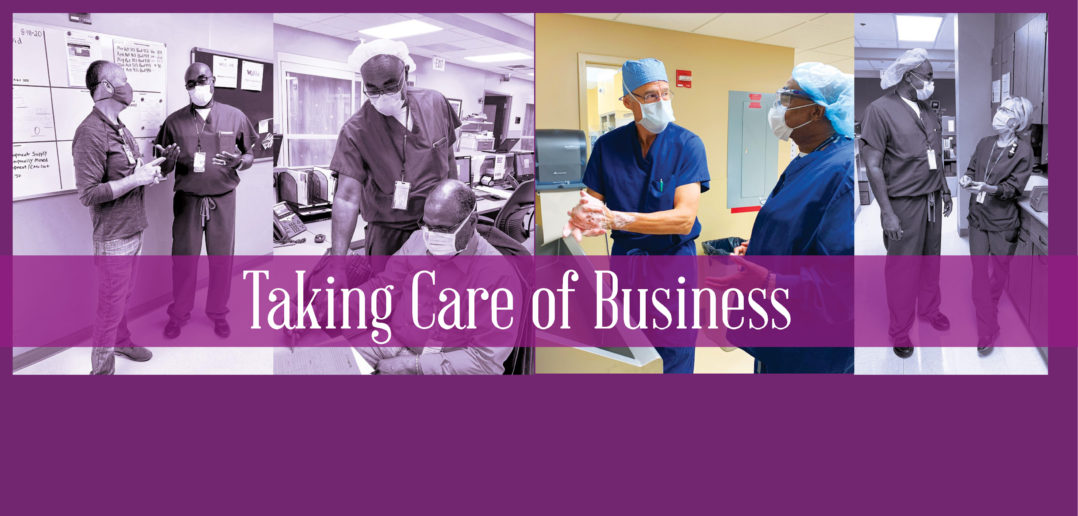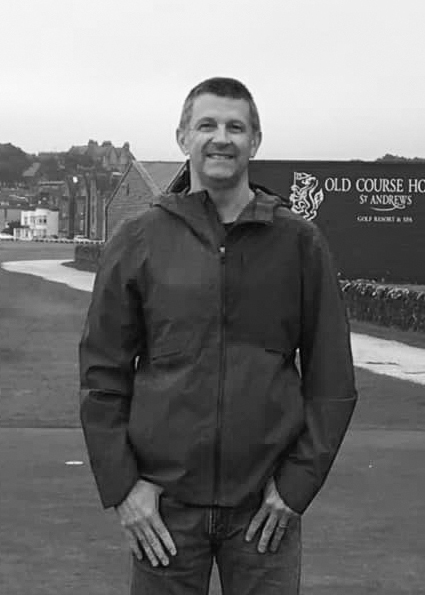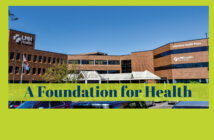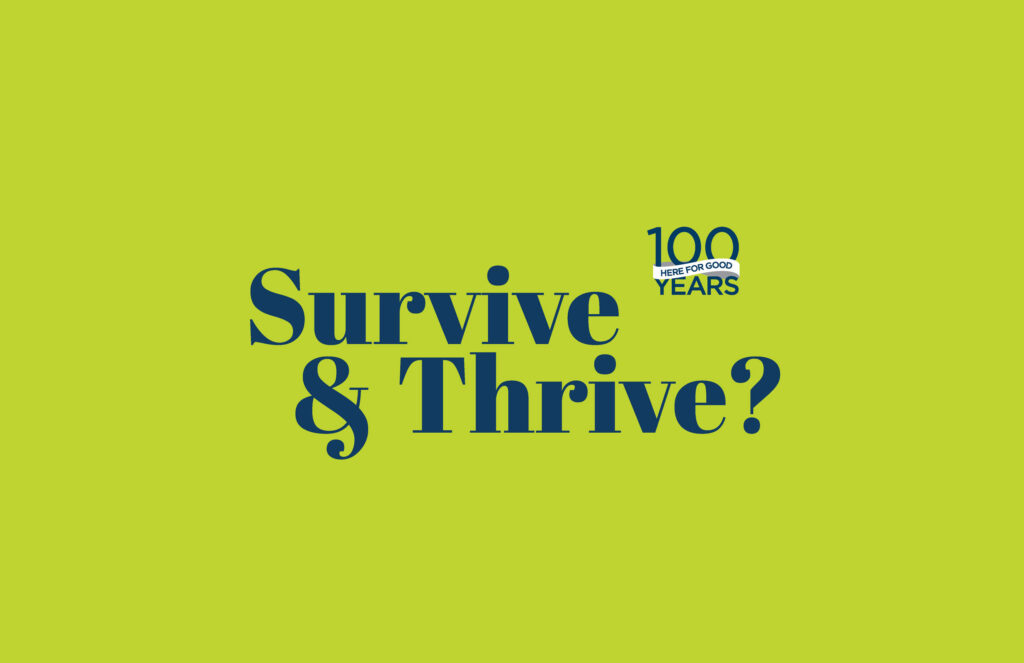The jobs of essential health-care workers, from doctors and nurses to first responders to facilities workers, have become even more vital because of the COVID pandemic.
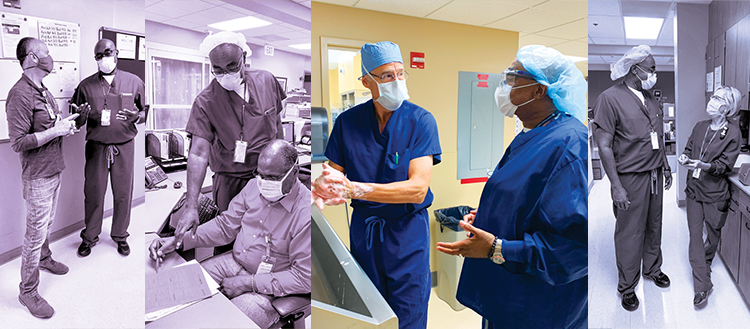
L to R: James Fly, director of Surgical Services at LMH speaks with Russ Johnson, President and CEO; James goes over daily schedule with a co-worker; Scrubbing up and communicating with co-workers is essential at LMH.
James Fly is happy to discuss and tout the essential work he and his Surgical Services department undertake on a daily basis at LMH Health.
He’s just as quick to point out areas of the hospital’s operations that might not be as obvious as medical personnel performing surgery but are just as critical to its effectiveness as one of the top medical and health centers in the Lawrence and Douglas County area.
“When people talk about essential health workers, I think they often only think of doctors and nurses,” says Fly, RN, MSN, MBA, director of Surgical Services at LMH. “When I think of essential workers, I think of (emergency medical services), dietary specialists, aides, facilities workers, first- responders, maintenance workers. They really run the gamut of all the many different areas and operations of the hospital, and they’re all essential.”
All those departments and jobs working in unison became even more vital with the arrival of the novel coronavirus—officially dubbed COVID-19—in March. In the six months since, the virus, believed to have originated in Wuhan, China, has infected more than 25 million worldwide, resulting in nearly 850,000 deaths. In the U.S., as of August 31, 2020, there have been almost 6 million cases reported and more than 182,000 deaths.
Lawrence and LMH haven’t been hit as hard as many other areas of the U.S.—and the world—but it has been hit. As of August 30, Lawrence-Douglas County Public Health had reported 1,303 total cases and eight deaths in the county. An infection rate that was spiking dramatically toward the end of June began decreasing in early July once the wearing of masks became a requirement in public spaces and bars were ordered closed. But it has increased in August with the return of college students.
Telling, however, was that in that same time frame, not a single staff member at LMH tested positive because of contact with a positive patient or employee in the facility.
“We’ve had some staff that had to be quarantined,” Fly says. “I, myself, was quarantined for a week because I came in contact with somebody.”
But, as Fly points out, instances of positive cases occurring within the LMH confines have been avoided, not only because of the care and professionalism of doctors and nurses, but also that of all the various areas of the hospital, from techs and aides to housekeeping and administrators. Everyone plays, has played and will continue to play a role, he explains.
“The pandemic has presented unique and difficult circumstances that make it challenging to keep frontline providers safe, even under the best of cases,” Fly says. “Ensuring the safety of clinicians, employees and patients is our top priority.”
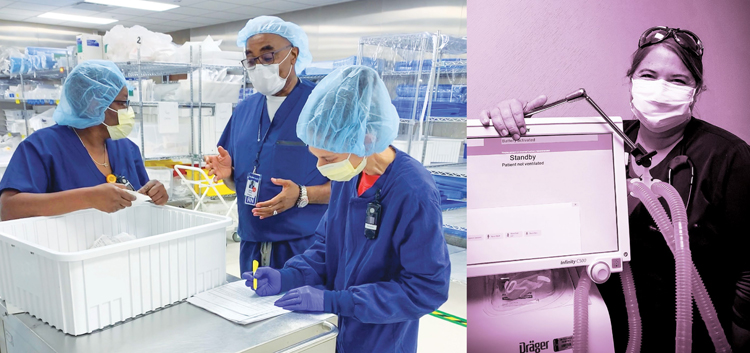
Left: James discussing supply needs with the staff. Right: Summer Oakson, registered respiratory therapist
A Vital Role
Actually, Fly’s Surgical Services department was one of the few areas of the hospital that saw business slacken during the height of the coronavirus pandemic. As the entire country locked down in mid-March, elective surgeries were prohibited as a way to ensure hospitals and medical centers had the available capacity for what was expected to be an onslaught of COVID patients. A department that averaged 450 to 500 surgeries per month suddenly dropped by about 75 percent.
“When we stopped elective surgery, it greatly affected our surgery schedule,” Fly says.
What was 343 cases in March became 162 in April. He says he was forced to furlough some staff, but most were put back into a labor pool and reassigned to other positions, such as a phone bank, the Respiratory Evaluation Clinic or screening incoming patients. By the end of May, after the initial lockdown had eased, the number of cases rebounded to 355 and bounced all the way back to 513 in June.
“We’re slowly climbing our way back to pre-COVID numbers,” Fly says.
When it comes to the pandemic, he believes the most essential function he performs at LMH is being in charge of the Sterile Processing Department. Most vital to that role has been procuring and sterilizing N95 masks—a face piece for use and reuse by all staff that meets national standards and filters at least 95 percent of airborne particles.
Early on in the pandemic, personal protection equipment (PPE) was in short supply at many medical centers throughout the U.S., including LMH. A major breakthrough came later in the spring, however, in the form of a white paper out of the University of Nebraska that detailed how to process and sterilize N95 masks for reuse. A nonprofit company named Battelle, Columbus, Ohio, dedicated itself to processing and sterilizing thousands upon thousands of N95 masks daily.
LMH adopted this system, where it took thousands of N95 masks, sent them to Topeka for sterilization then had them returned for reuse. This system can process up to 80,000 masks per day and went a long way toward solving the PPE shortages LMH was experiencing.
Sterilized N95 masks can be used up to 20 times.
As for the Surgical Services part of his job, Fly says its processes haven’t changed that much. All surgery staff are required to wear N95s, goggles and a face shield, as well as gowns and gloves. The Respiratory Evaluation Clinic tests all patients 48 hours before surgery. If the test is negative, the surgery proceeds as scheduled. If not, there’s the option to cancel.
“As it relates to the (operating room), we clean everything as we always have,” he says.
The Cloud of COVID
Although the novel coronavirus is now known to adversely affect multiple parts of the body, it originally was considered a respiratory disease. That effectively made an already-vital role of the hospital—respiratory therapist—all the more essential. When a COVID-positive, fully symptomatic patient reaches the hospital, he or she is likely having difficulty breathing. It’s the job of the respiratory therapist to help ease those symptoms and administer treatments to improve the patient’s condition.
“We use universal precautions for every patient we encounter to protect the patient, and ourselves, from unknown exposure to any infectious disease,” says Summer Oakson, registered respiratory therapist. “I’ve seen people with bad coughs and fever. It runs the gamut. Much of how we treat patients depends upon preexisting health conditions.”
Oakson says she typically works nights, usually in the emergency room. She sees 20 to 30 patients on an average night and spends most of her time administering various breathing treatments to patients and working with patients on ventilators, including assisting physicians with intubation, as well as drawing blood to test oxygenation levels.
The level of care for each patient differs, she says, but everything has stepped up a level since the arrival of COVID.
Oakson explains that patient rooms are divided into “clean” and “dirty” sides. Staff enters one side of a room clean and exits the other side dirty, ensuring areas in between are not contaminated.
“I’ve definitely seen a change,” she says. “We learned to put on PPE the correct way and as quickly as possible. I see housekeepers working their tails off. We all recognize we’re busy. Everyone is working better as a team.”
Like all LMH Health staff members, Oakson says she looks forward to a day when COVID no longer permeates everything she and her colleagues do in treating patients.
“I’m mostly looking forward to seeing my colleagues’ full faces,” she says.
Even the cloud of COVID hasn’t completely prevented some humorous moments, says Oakson, recalling a particular “Star Wars” reference.
“I had one patient who was video-chatting with their family while I was in the room,” she says. “And all they asked was that myself and the nursing team look into the camera with our masks on and say, ‘Luke, I am your father.’ That’s all they asked.”
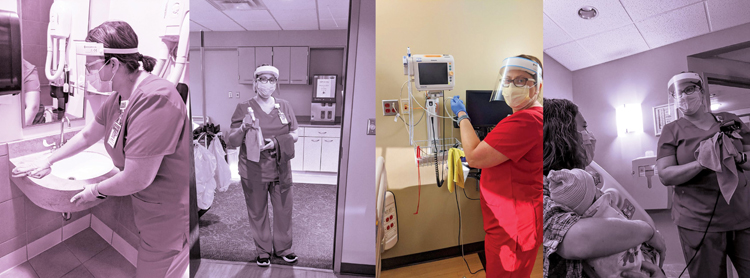
Jennifer Glendening, Environmental Services Technician. Cleaning is a priority at all times for LMH and even more so during the pandemic
Ensuring a Sterile Environment
Given the veracity and high contagion of the novel coronavirus, perhaps no role is more important at LMH than that of the Environmental Services team. This is the team of professionals that cleans patient areas and makes sure all surfaces are disinfected—from door knobs to telephones to call lights, anything that could be touched in the hospital. The team did this before COVID-19 existed, and the job has only intensified during the last six months.
“We want to make sure everything is disinfected,” says Jennifer Glendening, environmental services technician. “We do this daily. It’s not really related to COVID. Our cleaning hasn’t really changed. If we’re cleaning a COVID room, we’re disinfecting top to bottom in a full body suit with (ultraviolet) light.”
There have been noticeable changes to some of the processes in performing environmental services, she continues.
“Now we have to wear masks,” she says. “That started in March. And we’ve implemented face shields and goggles. There are temperature checks for staff every morning.
“There are certain entrances staff can come in to ensure everyone is wearing masks and are compliant with all safety protocols,” she adds.
For highly contagious rooms, Glendening says “negative pressure” is used, limited airflow that’s not refiltrated throughout the room. She says all the steps and protocols undertaken by her team and all other areas at LMH have made her feel, for the most part, comfortable coming to work during a highly contagious global pandemic.
“Nobody in our department has gotten sick,” she says. “I know it’s there, but I kind of put it on the back burner. I know I have a job to do. I want to do that to the best of my ability. That not only includes for the safety and health of our patients, but also for myself.”
Glendening says it does feel different around LMH, however. Few visitors are allowed in, so personal interaction is limited.
“But I know we’re taking the right steps,” she says. “I feel safe. I know we’re doing what we’re supposed to be doing.
“I want to come to work with a smile on my face. And, I still do,” she says.

